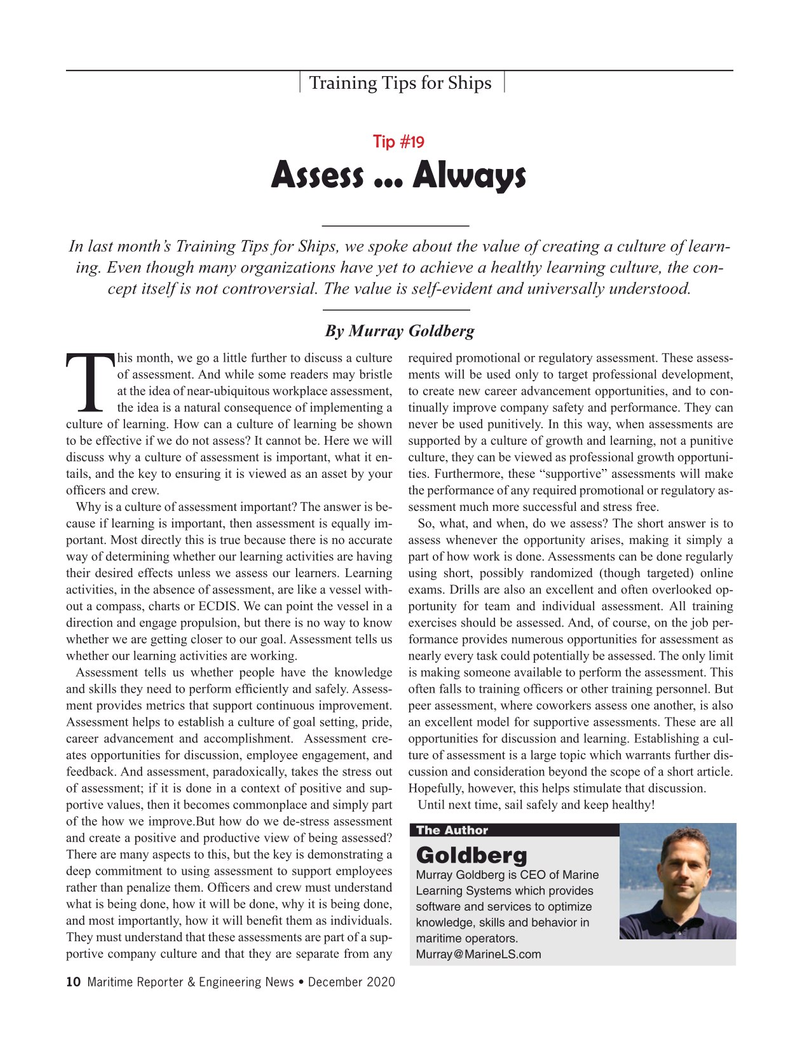
Page 10: of Maritime Reporter Magazine (December 2020)
Great Ships of 2020
Read this page in Pdf, Flash or Html5 edition of December 2020 Maritime Reporter Magazine
Training Tips for Ships
Tip #19
Assess ... Always
In last month’s Training Tips for Ships, we spoke about the value of creating a culture of learn- ing. Even though many organizations have yet to achieve a healthy learning culture, the con- cept itself is not controversial. The value is self-evident and universally understood.
By Murray Goldberg his month, we go a little further to discuss a culture required promotional or regulatory assessment. These assess- of assessment. And while some readers may bristle ments will be used only to target professional development, at the idea of near-ubiquitous workplace assessment, to create new career advancement opportunities, and to con-
T the idea is a natural consequence of implementing a tinually improve company safety and performance. They can culture of learning. How can a culture of learning be shown never be used punitively. In this way, when assessments are to be effective if we do not assess? It cannot be. Here we will supported by a culture of growth and learning, not a punitive discuss why a culture of assessment is important, what it en- culture, they can be viewed as professional growth opportuni- tails, and the key to ensuring it is viewed as an asset by your ties. Furthermore, these “supportive” assessments will make of? cers and crew. the performance of any required promotional or regulatory as-
Why is a culture of assessment important? The answer is be- sessment much more successful and stress free.
cause if learning is important, then assessment is equally im- So, what, and when, do we assess? The short answer is to portant. Most directly this is true because there is no accurate assess whenever the opportunity arises, making it simply a way of determining whether our learning activities are having part of how work is done. Assessments can be done regularly their desired effects unless we assess our learners. Learning using short, possibly randomized (though targeted) online activities, in the absence of assessment, are like a vessel with- exams. Drills are also an excellent and often overlooked op- out a compass, charts or ECDIS. We can point the vessel in a portunity for team and individual assessment. All training direction and engage propulsion, but there is no way to know exercises should be assessed. And, of course, on the job per- whether we are getting closer to our goal. Assessment tells us formance provides numerous opportunities for assessment as whether our learning activities are working. nearly every task could potentially be assessed. The only limit
Assessment tells us whether people have the knowledge is making someone available to perform the assessment. This and skills they need to perform ef? ciently and safely. Assess- often falls to training of? cers or other training personnel. But ment provides metrics that support continuous improvement. peer assessment, where coworkers assess one another, is also
Assessment helps to establish a culture of goal setting, pride, an excellent model for supportive assessments. These are all career advancement and accomplishment. Assessment cre- opportunities for discussion and learning. Establishing a cul- ates opportunities for discussion, employee engagement, and ture of assessment is a large topic which warrants further dis- feedback. And assessment, paradoxically, takes the stress out cussion and consideration beyond the scope of a short article. of assessment; if it is done in a context of positive and sup- Hopefully, however, this helps stimulate that discussion. portive values, then it becomes commonplace and simply part Until next time, sail safely and keep healthy!
of the how we improve.But how do we de-stress assessment
The Author and create a positive and productive view of being assessed?
There are many aspects to this, but the key is demonstrating a
Goldberg deep commitment to using assessment to support employees
Murray Goldberg is CEO of Marine rather than penalize them. Of? cers and crew must understand
Learning Systems which provides what is being done, how it will be done, why it is being done, software and services to optimize and most importantly, how it will bene? t them as individuals. knowledge, skills and behavior in
They must understand that these assessments are part of a sup- maritime operators. portive company culture and that they are separate from any
[email protected] 10 Maritime Reporter & Engineering News • December 2020
MR #12 (1-17).indd 10 12/4/2020 8:38:00 AM

 9
9

 11
11
